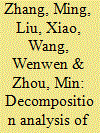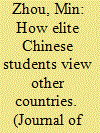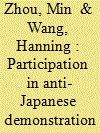|
|
|
Sort Order |
|
|
|
Items / Page
|
|
|
|
|
|
|
| Srl | Item |
| 1 |
ID:
154233


|
|
|
|
|
| Summary/Abstract |
This study looks at the sources of anti-Japanese sentiment in today’s China. Using original survey data collected in June 2014 from 1,458 students at three elite universities in Beijing, we quantitatively investigate which factors are associated with stronger anti-Japanese sentiment among elite university students. In particular, we examine the link between the Chinese Communist Party (CCP)’s nationalist propaganda (especially patriotic education) and university students’ anti-Japanese sentiment. We find that nationalist propaganda does indeed have a significant effect on negative sentiment towards Japan. Reliance on state-sanctioned textbooks for information about Japan, visiting museums and memorials or watching television programmes and movies relating to the War of Resistance against Japan are all associated with higher levels of anti-Japanese sentiment. The findings suggest the effectiveness of nationalist propaganda in promoting anti-Japanese sentiment. We also find that alternative sources of information, especially personal contact with Japan, can mitigate anti-Japanese sentiment. Thus, visiting Japan and knowing Japanese people in person can potentially offset some of the influences of nationalist propaganda.
|
|
|
|
|
|
|
|
|
|
|
|
|
|
|
|
| 2 |
ID:
117233


|
|
|
|
|
| Publication |
2013.
|
| Summary/Abstract |
Electricity generation in China mainly depends on coal and its products, which has led to the increase in CO2 emissions. This paper intends to analyze the current status of CO2 emissions from electricity generation in China during the period 1991-2009, and apply the logarithmic mean Divisia index (LMDI) technique to find the nature of the factors influencing the changes in CO2 emissions. The main results as follows: (1) CO2 emission from electricity generation has increased from 530.96 Mt in 1991 to 2393.02 Mt in 2009, following an annual growth rate of 8.72%. Coal products is the main fuel type for thermal power generation, which accounts for more than 90% CO2 emissions from electricity generation. (2) This paper also presents CO2 emissions factor of electricity consumption, which help calculate CO2 emission from final electricity consumption. (3) In China, the economic activity effect is the most important contributor to increase CO2 emissions from electricity generation, but the electricity generation efficiency effect plays the dominant role in decreasing CO2 emissions.
|
|
|
|
|
|
|
|
|
|
|
|
|
|
|
|
| 3 |
ID:
165963


|
|
|
|
|
| Summary/Abstract |
This study examines Chinese university students' feelings towards foreign countries, using original high-quality survey data collected in 2014 at three top universities in Beijing. First, elite Chinese students' perceptions of specific countries are revealed. Being from top universities, these individuals will have great influence on China's future politics and international relations. It is thus important to gauge their perceptions of other countries. They generally feel warmly towards the European Union, Russia, and the United States, but harbour cold feelings towards Northeast Asian neighbours (Japan and the two Koreas). Second, this study finds that the effects of the socio-demographic and political factors underlying students' feelings differ greatly from country to country. I construct various social profiles of the students (dis)liking particular countries. Third, this study establishes a connection between nationalism and feelings towards particular countries. Chinese nationalism is not equally targeted at all other countries. While it elevates animosity mainly against Japan and the US, it promotes a closer rapport with North Korea and Russia.
|
|
|
|
|
|
|
|
|
|
|
|
|
|
|
|
| 4 |
ID:
148521


|
|
|
|
|
| Summary/Abstract |
Nationwide anti-Japanese demonstrations have erupted in China periodically in recent years. This study investigates what factors make university students more motivated to participate in anti-Japanese demonstrations. We collected original data on 1,458 university students in Beijing in June 2014, inquiring about both actual and possible future participation. We find that students are more willing to participate in future demonstrations (1) when they believe that anti-Japanese demonstrations benefit China's diplomacy (instrumentality), and (2) when they have prior demonstrators in their social networks (diffusion). However, when it comes to actual participation, only diffusion plays a significant role while instrumentality does not. While students claim that they are motivated by beliefs that demonstrations will matter for China's diplomacy, they actually turn out only when networks operate. In addition, membership in the Chinese Communist Party (CCP) does not affect prospective participation but deters actual participation. The CCP actually discourages participation in recent anti-Japanese demonstrations.
|
|
|
|
|
|
|
|
|
|
|
|
|
|
|
|
| 5 |
ID:
186619


|
|
|
|
|
| Summary/Abstract |
Using national survey data collected in 2010, this article explores how affiliation with a work unit (danwei, a public or state-owned institution) discourages people from taking part in popular protest in China. Empirical analysis shows that individuals employed in a work unit or with strong social ties (such as a spouse) to a work unit are less likely to protest. The negative effect of work-unit affiliation on protest participation is so effective that it remains significant even when personal interests are at stake. Further analysis indicates that affiliation with a work unit depresses protest participation both directly and indirectly, which suggests that affiliation status is empowering as well as constraining. In addition to quieting people directly, work-unit affiliation is also associated with a higher social status that empowers people to address their grievances before a protest is called for. Despite the dwindling number of people working in work units, the continuing effectiveness of protest control and the amplifying effect of social ties of those who remain in work units still provide a reliable mechanism for limiting popular protest in China.
|
|
|
|
|
|
|
|
|
|
|
|
|
|
|
|
|
|
|
|
|